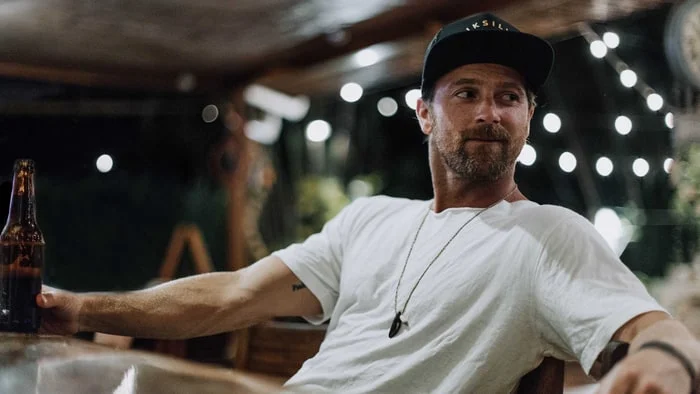Kip Moore
Singer-songwriter Kip Moore explored his own experiences of growing up in a small Georgia town and working diligently for years to achieve his musical dreams to create his MCA Nashville debut album, Up All Night. The album poetically captures those unforgettable coming-of-age moments, especially for those longing for a life beyond a small town’s borders, as well as the roller coaster of love and heartbreak at any age. He delivers these honest and deeply personal lyrics with a gravelly voice weathered by life’s detours and disappointments and strengthened by his dreams and unyielding determination.Up All Night, which includes the hit “Somethin’ ‘Bout a Truck,” is infused with relentless intensity, both of passion and frustration, that is earning rave reviews from critics. His energetic live shows, including a spring tour with Billy Currington and David Nail, are quickly drawing a large and enthusiastic fan base.”For years, I have been searching for the missing link between blue-collar rock and country music,” says noted journalist/historian Robert K. Oermann, who writes for Music Row magazine. “This year, I think I have heard it. His name is Kip Moore. There is fiery, urgent intensity in his voice. His lyrics vibrate with conviction and true grit. The melodies have gripping, heart-in-throat passion. And the roaring, propulsive performances on his debut album sound like signposts on the highway to some Southern-fried Born to Run. Dare I say it? This man just might be the hillbilly Springsteen.”Says Billboard Country Monitor’s Tom Roland, “Gritty, earthy vocals layered over powerfully simple arrangements. Moore isn’t flashy, but the subtle frame he creates for his blue-collar portraits make the images seem that much more real. It also suggests he’s confident in his songs and his performance. Which he ought to be.”Kip chose Up All Night as the album’s title because the phrase has multiple meanings to him. “I spent so many late nights writing this record,” he says. “I was up until three or four in the morning listening to records and practicing and writing songs and being engulfed in the whole process for years. I had a lot of dark moments along the way and spent late nights crafting these songs. But it can also mean just the late nights on the road having a good time. It means a variety of things, and that’s why I went with that title and the song is one my favorites on the album.”Kip, who had a hand in writing all 11 songs on the album, isn’t interested in depicting a fairy-tale kind of love. “I am drawn to the real-life experiences between a woman and a man. I try to sing about the way it is, but yet at the same time, what you can hope for between a couple. I don’t intend to paint a picture of what it’s really not.”Up All Night reveals some of the contradictions that he grapples with personally. Although he’s from a large family and enjoys musical collaborations and performing onstage, he’s an introvert who is often more comfortable being alone. “There’s a combativeness to the music too, a fight within,” he says. “With ‘Faith When I Fall,’ I know how bad I need that spiritual realm, but yet I find myself on this other end a lot of times.”Despite its edge, his music remains desperately optimistic. “I am hoping for what I have yet to become,” he says. “I feel like it’s hopeful for what I’ve yet reached, how I look forward to feeling, but I haven’t gotten there yet.”I have truly lived my music to a sense, even the milestones I haven’t reached yet,” he says. “I have been in those moments. I’ve been at those crossroads with a girl: ‘Are we going to take that next step?’ I look forward to taking that next step, but I haven’t wanted to yet. I look forward to being ready for that.”He was born in Tifton, Ga., near the Florida line, and was one of six children, the youngest boy who had three younger sisters. “You had to make your own fun, for sure,” he says of Tifton. “I had a lot of time for daydreaming. It was a great town, but I dreamed about getting out. I do enjoy going back now.”His father was a golf pro and his mother was a painter who used anything handy for a canvas, whether it was cake plates or baby crates. She also taught piano and played the church organ. Weekends were often spent driving to the beach with his father for fishing expeditions. “He would play a lot of Jackson Browne, Willie Nelson, Bob Seger, Tom Petty and Bruce Springsteen,” he says. “As early as I can remember, I always gravitated toward lyrics. Even when I hadn’t lived enough to understand them, they still shaped me. “During high school, he began playing his brother’s guitar, but his focus largely remained on athletics. He played point guard for Wallace State’s basketball team and also played on its golf team in Hanceville, Ala., for two years and then transferred to Valdolsta State University on a golf scholarship. But music became a growing passion. He wrote songs daily and joined a band that performed throughout the South, providing him with all of his income.After graduation, he moved to Hawaii on a whim with just a backpack, a surfboard and a friend. They slept on an airport bench the first night and then lucked into a hut that was $50 a month. After six months of this tropical paradise, Kip thought he had found his permanent home until his friend encouraged him to pursue songwriting as a living.”I didn’t know a whole lot about the world of songwriting,” he says. “I just did it for my own enjoyment. We talked about Nashville and I ended up saying, ‘I’m going to give it a shot.’ I flew back home and told my folks. They thought I was crazy. Now they’ll say different, that they knew all along.”He drove to Nashville on Jan. 1, 2004 in an old black Nissan truck that contained one bag and his guitar. He immersed himself in the songwriting community, observing songwriters’ rounds for two years and honing his craft before gaining the confidence to join in. After four years of performing locally, he caught the attention of Creative Artist Agency’s Marc Dennis, who called Universal Music Group Nashville’s Joe Fisher. Not only did Joe’s encounter lead to his record deal with MCA Nashville, but it also brought about his introduction to songwriter Brett James, who produced Kip’s debut album.”Brett gave me the freedom to find who I was as an artist, the freedom for writing a different kind of thing, a different kind of melody and lyric,” he says. “He gave me room to grow.”He also found important relationships with songwriters Dan Couch, Scott Steppakoff, Westin Davis and Kiefer Thompson. “There was definitely a special thing when we got in the room together,” Kip says. “They were open to my ideas of being different.”And different his debut project is, as evidenced his first hit, ‘Somethin’ ‘Bout a Truck,” which was written from personal experience. “I think anybody that comes from a small town has lived that song. I lived that song 5,000 times growing up. When you are from a small town like I am, there’s not a whole lot to do. You have to make your own fun and there’s a whole lot of sitting in fields, and a whole lot of Bud Light and fishing poles. It’s real hot in south Georgia, so all of the girls were wearing sundresses. It was all you needed back then – a truck bed, a radio and good company with you.”The anthemic “Drive Me Crazy” is the story of two troubled teens who find a safe harbor in each other, if only for a few fleeting moments. “They are the getaway car for each other from everyday life,” he says. “When they’re together, what they live in is in the rear-view mirror and it’s just one big infatuation love story that lasts for a very short time.”When Kip plays shows, he’s often asked for advice by aspiring songwriters. “Everybody’s experience is different, but I do believe it has to be the only thing,” he says. “I don’t think it can be a gray line. Either you want it and there’s nothing else or it’s not going to happen.”For instance, Kip was offered a sales position with an enticing salary, but it required working six days a week, leaving no time for creating music. “You come to the crossroads: do you really want this? Are you willing to sacrifice everything, including relationships? I can’t tell you how many relationships have been doomed from the get-go because of this.”It only took me a few minutes to decline it. It’s such a risk and it’s an alone feeling – you feel like you’re on an island by yourself – but it’s worth every single minute. Had I taken that job, I wouldn’t be sitting here today.”

